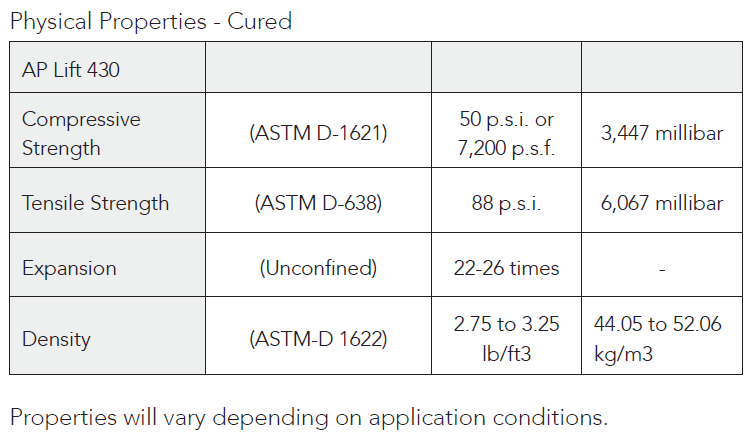
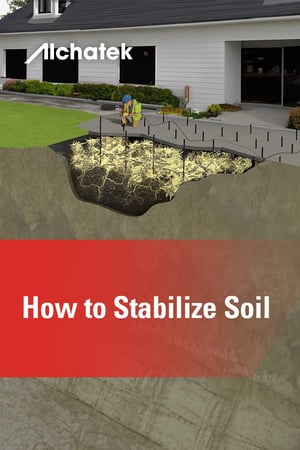 If you've noticed cracks or sinking in your patios, walkways, pool decks, or other slabs, the problem may lie beneath the surface. In fact, unstable soil around your home can lead to serious structural issues. But don't panic - there is a lasting solution. Keep reading to learn more about how to stabilize soil.
If you've noticed cracks or sinking in your patios, walkways, pool decks, or other slabs, the problem may lie beneath the surface. In fact, unstable soil around your home can lead to serious structural issues. But don't panic - there is a lasting solution. Keep reading to learn more about how to stabilize soil.
What Causes Soil Instability?
Several factors can cause the soil around your home to become unstable over time. For example, erosion due to poor drainage or leaky pipes can cause erosion. Additionally, poorly compacted fill dirt from the initial construction may settle unevenly. Furthermore, repeated freezing and thawing cycles can degrade soil over the years. Finally, the decay of buried organic material like tree stumps or construction debris can create voids beneath and around your home. Unstable soil can lead to serious structural issues. Therefore, it's crucial to address soil instability as soon as possible.
The Solution: Structural Polymer Injection
The good news is that unstable soil can be repaired using a process called polymer injection. This involves injecting a structural polymer into the ground. These advanced polymers fill voids, permeate loose soil, and then bind it together, creating a rock-solid base for your concrete slabs. Moreover, Alchatek's soil stabilization polymers are eco-friendly and NSF-certified to strict environmental standards.
Trust the Pros for Soil Stabilization
While polymer injection is a highly effective solution, it's not a job for amateurs. Successful soil stabilization requires specialized equipment, extensive knowledge of soil conditions and injection techniques, and a careful touch. That's why it's important to hire an experienced contractor who specializes in this type of work.
A qualified professional will follow a thorough process to stabilize your soil. First, they'll evaluate your property's unique soil conditions and needs. Next, they'll design a customized injection plan based on their findings. After that, they'll carefully install injection rods around the problem area. Then, they inject the polymer at specific pressures and volumes for maximum effect. Finally, they'll remove the injection rods and restore the site to its original condition.
Contact a Soil Stabilization Contractor
Contact a reputable contractor who specializes in soil stabilization today. They'll be able to assess your situation, recommend the best course of action, and stabilize the soil beneath your slabs. Stabilizing soil around your residence is an investment in your home's longevity and your family's safety. By trusting this job with a skilled professional, you can rest easy knowing that your biggest asset is protected for years to come.
Fill out this form or call 404-618-0438 for a contractor referral today!



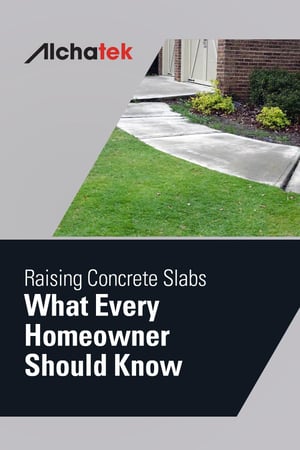 As a homeowner, you've probably seen sunken or uneven concrete slabs around your property. Not only are they unsightly, but they can also be dangerous trip hazards. Moreover, this problem can affect many areas, including:
As a homeowner, you've probably seen sunken or uneven concrete slabs around your property. Not only are they unsightly, but they can also be dangerous trip hazards. Moreover, this problem can affect many areas, including:

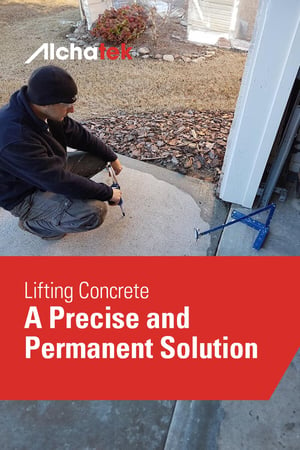 Do you have sinking or uneven concrete slabs around your home? Not only can they be an eyesore, but uneven walkways, driveways, and patios can also create tripping hazards and lead to costly accidents. Many homeowners assume their only option is to rip out the old concrete and pour new slabs. However, professional slab lifting offers a much better solution. Lifting concrete is a precise, permanent fix without the chaos and cost of ripping out and replacing old slabs. Keep reading to discover why slab lifting with polyurethane foam is the smart choice.
Do you have sinking or uneven concrete slabs around your home? Not only can they be an eyesore, but uneven walkways, driveways, and patios can also create tripping hazards and lead to costly accidents. Many homeowners assume their only option is to rip out the old concrete and pour new slabs. However, professional slab lifting offers a much better solution. Lifting concrete is a precise, permanent fix without the chaos and cost of ripping out and replacing old slabs. Keep reading to discover why slab lifting with polyurethane foam is the smart choice.
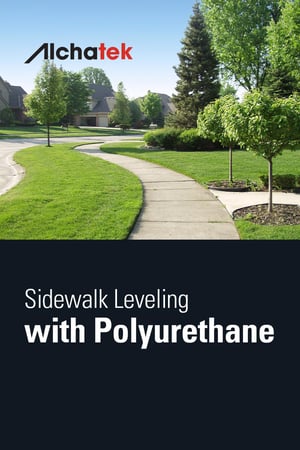 Sunken and uneven sidewalks are a common problem that can create trip hazards. Luckily, there's a fast and effective solution: sidewalk leveling using high-strength polyurethane foam. This innovative technique can raise sidewalks back to their proper height with minimal disruption and downtime compared to concrete replacement.
Sunken and uneven sidewalks are a common problem that can create trip hazards. Luckily, there's a fast and effective solution: sidewalk leveling using high-strength polyurethane foam. This innovative technique can raise sidewalks back to their proper height with minimal disruption and downtime compared to concrete replacement.
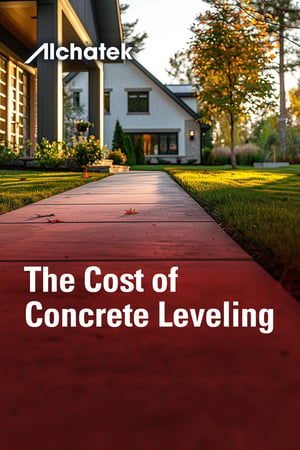 When fixing sunken or uneven concrete slabs, homeowners have a few options: repair with polyurethane, repair with mudjacking material, or replace the slab. Both polyurethane and mudjacking material lift and stabilize affected slabs without the need for complete demolition and replacement. However, notable differences exist between these approaches in price, effectiveness, and longevity. The cost of concrete leveling depends on these factors.
When fixing sunken or uneven concrete slabs, homeowners have a few options: repair with polyurethane, repair with mudjacking material, or replace the slab. Both polyurethane and mudjacking material lift and stabilize affected slabs without the need for complete demolition and replacement. However, notable differences exist between these approaches in price, effectiveness, and longevity. The cost of concrete leveling depends on these factors. 
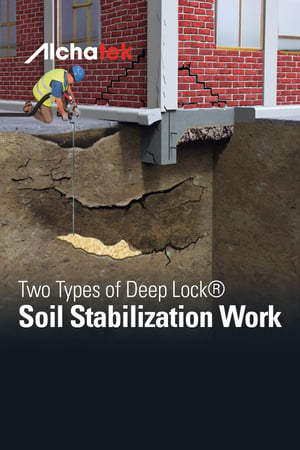 Deep Lock® is an innovative process developed by Alchatek that utilizes high-quality structural polymers to address deep soil issues. This powerful, painless, and rapid solution stabilizes soil at all levels, ensuring long-lasting results with minimal disruption to the property. This article profiles the two main types of Deep Lock® soil stabilization work and the specific situations in which each type is most effective.
Deep Lock® is an innovative process developed by Alchatek that utilizes high-quality structural polymers to address deep soil issues. This powerful, painless, and rapid solution stabilizes soil at all levels, ensuring long-lasting results with minimal disruption to the property. This article profiles the two main types of Deep Lock® soil stabilization work and the specific situations in which each type is most effective.

 Essential Details
Essential Details

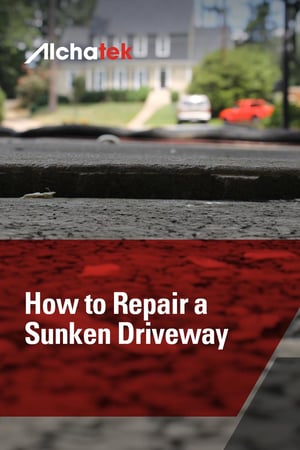 Sunken concrete slabs in your driveway can be a frustrating and unsightly problem. Not only do they detract from your home's curb appeal, but they can also create safety hazards for vehicles and pedestrians. Fortunately, there are effective ways to repair sunken slabs and restore your driveway to its original smooth, level surface. It’s essential to understand how to repair a sunken driveway properly.
Sunken concrete slabs in your driveway can be a frustrating and unsightly problem. Not only do they detract from your home's curb appeal, but they can also create safety hazards for vehicles and pedestrians. Fortunately, there are effective ways to repair sunken slabs and restore your driveway to its original smooth, level surface. It’s essential to understand how to repair a sunken driveway properly.
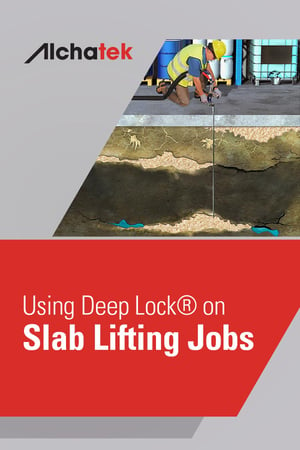 While Alchatek's Deep Lock® process is primarily used on deep soil stabilization jobs, there are specific situations in which deep soil stabilization may be needed to reinforce soil on slab lifting jobs. In cases where slabs are bearing heavy loads, have significantly loose soil underneath, or are located in areas where access is limited, incorporating the Deep Lock® process can help address the underlying soil stability issues. With the addition of the Deep Lock® soil stabilization process, contractors can achieve effective, minimally invasive slab lifting results while simultaneously improving the long-term stability of the foundation.
While Alchatek's Deep Lock® process is primarily used on deep soil stabilization jobs, there are specific situations in which deep soil stabilization may be needed to reinforce soil on slab lifting jobs. In cases where slabs are bearing heavy loads, have significantly loose soil underneath, or are located in areas where access is limited, incorporating the Deep Lock® process can help address the underlying soil stability issues. With the addition of the Deep Lock® soil stabilization process, contractors can achieve effective, minimally invasive slab lifting results while simultaneously improving the long-term stability of the foundation.
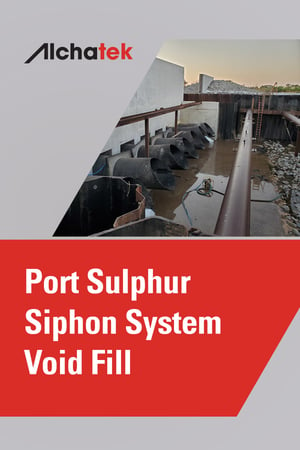 The Army Corp of Engineers (ACOE) builds and manages numerous projects along the rivers and waterways of the United States. On our mightiest river, the Mississippi, the ACOE was tasked with upgrading the large siphon systems that are used to draw down the river level during flood events. To prevent catastrophic flood damage, these siphons kick on if the river is going to crest over the top of the levees.
The Army Corp of Engineers (ACOE) builds and manages numerous projects along the rivers and waterways of the United States. On our mightiest river, the Mississippi, the ACOE was tasked with upgrading the large siphon systems that are used to draw down the river level during flood events. To prevent catastrophic flood damage, these siphons kick on if the river is going to crest over the top of the levees.